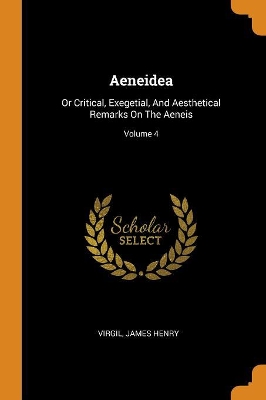Aeneidea 5 Volume Set
4 primary works
Volume 1
Born in Dublin and classically educated at Trinity College, James Henry (1798-1876) practised as a doctor for more than twenty years before an inheritance enabled him to focus on the textual study of Virgil's Aeneid. Travelling extensively across Europe, Henry conferred with eminent scholars and consulted numerous manuscripts. His early findings (also reissued in this series) first appeared in 1853. After the death of his wife, he was accompanied and assisted by his sole surviving daughter, Katherine Olivia, who would also predecease him, three years after their final return to Ireland in 1869. Published between 1873 and 1892, this monumental commentary was seen through the press by colleagues following Henry's own death. Reflecting its author's passion and personality, the work remains a landmark in Virgilian scholarship, both celebrated and critiqued for its original and challenging approach. This first volume, covering Book I, appeared in 1873.
Volume 3
Born in Dublin and classically educated at Trinity College, James Henry (1798-1876) practised as a doctor for more than twenty years before an inheritance enabled him to focus on the textual study of Virgil's Aeneid. Travelling extensively across Europe, Henry conferred with eminent scholars and consulted numerous manuscripts. His early findings (also reissued in this series) first appeared in 1853. After the death of his wife, he was accompanied and assisted by his sole surviving daughter, Katherine Olivia, who would also predecease him, three years after their final return to Ireland in 1869. Published between 1873 and 1892, this monumental commentary was seen through the press by colleagues following Henry's own death. Reflecting its author's passion and personality, the work remains a landmark in Virgilian scholarship, both celebrated and critiqued for its original and challenging approach. This third volume, covering Books V-IX, appeared in 1889.
Volume 4
Born in Dublin and classically educated at Trinity College, James Henry (1798-1876) practised as a doctor for more than twenty years before an inheritance enabled him to focus on the textual study of Virgil's Aeneid. Travelling extensively across Europe, Henry conferred with eminent scholars and consulted numerous manuscripts. His early findings (also reissued in this series) first appeared in 1853. After the death of his wife, he was accompanied and assisted by his sole surviving daughter, Katherine Olivia, who would also predecease him, three years after their final return to Ireland in 1869. Published between 1873 and 1892, this monumental commentary was seen through the press by colleagues following Henry's own death. Reflecting its author's passion and personality, the work remains a landmark in Virgilian scholarship, both celebrated and critiqued for its original and challenging approach. This fourth volume, covering Books X-XII, appeared in 1889.
Volume 5
Born in Dublin and classically educated at Trinity College, James Henry (1798-1876) practised as a doctor for more than twenty years before an inheritance enabled him to focus on the textual study of Virgil's Aeneid. Travelling extensively across Europe, Henry conferred with eminent scholars and consulted numerous manuscripts. His early findings (also reissued in this series) first appeared in 1853. After the death of his wife, he was accompanied and assisted by his sole surviving daughter, Katherine Olivia, who would also predecease him, three years after their final return to Ireland in 1869. Published between 1873 and 1892, this monumental commentary was seen through the press by colleagues following Henry's own death. Reflecting its author's passion and personality, the work remains a landmark in Virgilian scholarship, both celebrated and critiqued for its original and challenging approach. This final volume, comprising an index of names and matters, and an index of authors quoted, appeared in 1892.

